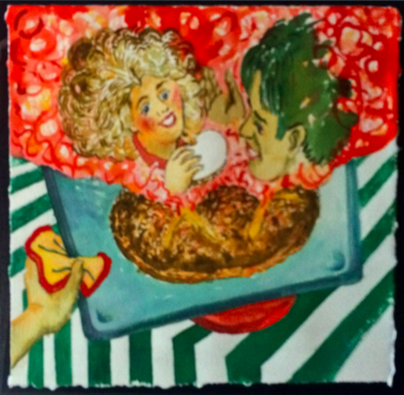EKPHRASIS : Art Describing Art : 2015
California Writers Club, Mendocino Branch : A Collaboration : Artists Co-Op of Mendocino
Writers Providing Works for Visual Artists Responses
Ginny Rorby “Leavening”
Provided work for the responding visual artist,
Lynne Zickerman “Baking Bread Dreams and Wishes”

LEAVENING by Ginny Rorby
“I’m too young and too good looking to stay married to a son of a bitch like you,” said Nell, my father’s first wife on the day she left him. I only know this because my mother, Daddy’s second wife, took great pleasure in repeating it when she was mad at him. I don’t think she ever met Nell, so Daddy must have told her. He had a sense of humor about things like that.
Reminding us of Nell’s parting words clearly lifted my mother’s spirits. She’d smile as if Nell would be pleased to know she’d made the right decision. The failures of my father’s youth were as robust today as if they’d been keep in a cool, dry place and fed regularly—like a jar of sourdough starter.
A day recently spent baking my first loaf of bread reminded me of my mother’s retaliation decades after my parents departed this life, and years spent feeding my own recriminations.
When my dad was married to Nell they lived in Alameda—a fact I discovered by accident on Ancestry.com. I knew he’d worked in San Francisco—a city he loved and talked about for the rest of his life, but I didn’t know he’d been married to Nell back then.
In 1966, when I started work as a ‘stewardess,’ I regularly flew to San Francisco. On one of my first trips, I brought back a loaf of sourdough bread for my father. On occasion, Daddy liked to cook. When the urge came, he’d make amazing lasagna or Russet potatoes boiled in resin, a recipe he got from Aunt Fannie’s Cabin in Atlanta. Daddy asked me to bring him a packet of sourdough starter next trip so he could make his own bread. On subsequent layovers, I visited bakeries, grocery stores, and restaurants, trying to find someone with starter to share. It was the only thing he ever asked me for and I never found any. My father’s dream of baking his own bread faded, as did my mother’s need to punish him with Nell’s words.
There’s a picture of my dad on my mantel. I came home with my loaf of freshly baked sourdough and brought myself to tears wishing I could show it to him. I wanted another chance to bring him starter, which I now have in my fridge, and to tell him Nell and Momma were wrong. He was not a son of a bitch. He was a man consigned to an ordinary life, never to be as happy again as he’d been in San Francisco. And I wanted to tell him I’d been wrong, too, siding with my mother, hating him for her sake.
“I’m too young and too good looking to stay married to a son of a bitch like you,” said Nell, my father’s first wife on the day she left him. I only know this because my mother, Daddy’s second wife, took great pleasure in repeating it when she was mad at him. I don’t think she ever met Nell, so Daddy must have told her. He had a sense of humor about things like that.
Reminding us of Nell’s parting words clearly lifted my mother’s spirits. She’d smile as if Nell would be pleased to know she’d made the right decision. The failures of my father’s youth were as robust today as if they’d been keep in a cool, dry place and fed regularly—like a jar of sourdough starter.
A day recently spent baking my first loaf of bread reminded me of my mother’s retaliation decades after my parents departed this life, and years spent feeding my own recriminations.
When my dad was married to Nell they lived in Alameda—a fact I discovered by accident on Ancestry.com. I knew he’d worked in San Francisco—a city he loved and talked about for the rest of his life, but I didn’t know he’d been married to Nell back then.
In 1966, when I started work as a ‘stewardess,’ I regularly flew to San Francisco. On one of my first trips, I brought back a loaf of sourdough bread for my father. On occasion, Daddy liked to cook. When the urge came, he’d make amazing lasagna or Russet potatoes boiled in resin, a recipe he got from Aunt Fannie’s Cabin in Atlanta. Daddy asked me to bring him a packet of sourdough starter next trip so he could make his own bread. On subsequent layovers, I visited bakeries, grocery stores, and restaurants, trying to find someone with starter to share. It was the only thing he ever asked me for and I never found any. My father’s dream of baking his own bread faded, as did my mother’s need to punish him with Nell’s words.
There’s a picture of my dad on my mantel. I came home with my loaf of freshly baked sourdough and brought myself to tears wishing I could show it to him. I wanted another chance to bring him starter, which I now have in my fridge, and to tell him Nell and Momma were wrong. He was not a son of a bitch. He was a man consigned to an ordinary life, never to be as happy again as he’d been in San Francisco. And I wanted to tell him I’d been wrong, too, siding with my mother, hating him for her sake.
